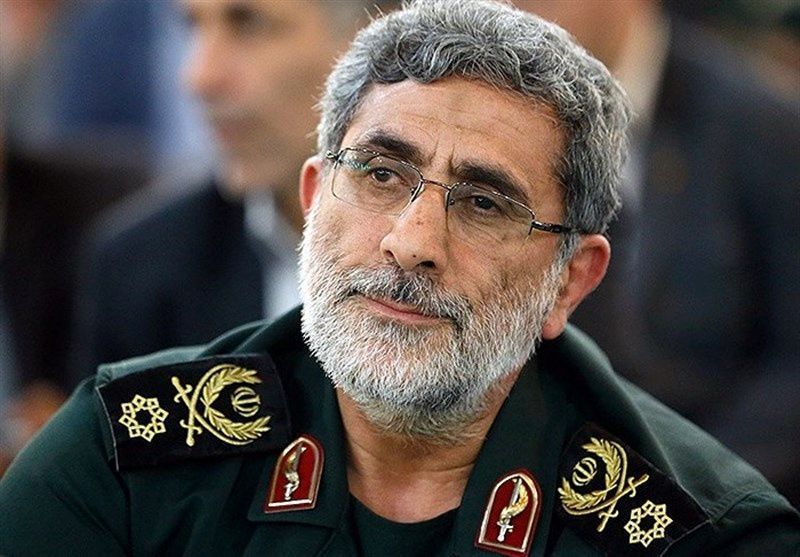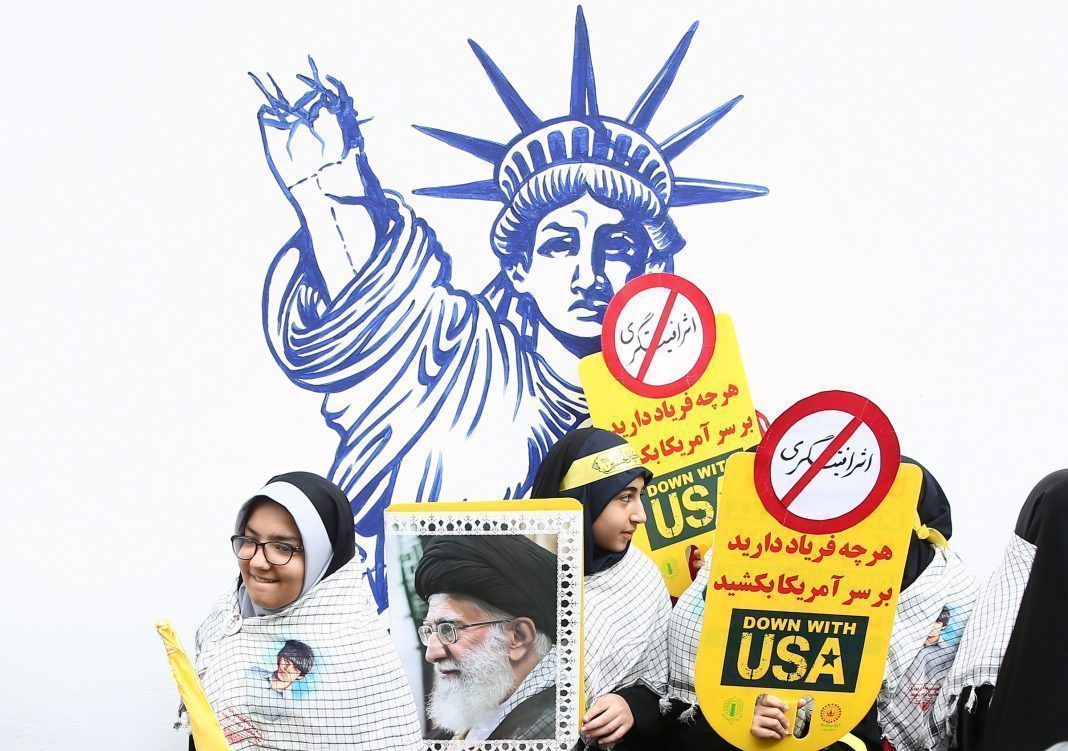By Babak Dehghanpisheh, Parisa Hafezi and Ahmed Aboulenein
DUBAI/BAGHDAD, Jan 9 (Reuters) – Iran spurned the U.S. president’s call for a new nuclear pact and its commanders threatened more attacks as the Middle East remained on edge following the U.S. killing of an Iranian general and Tehran’s retaliatory missile strikes.
Concern the war-scarred region was primed for a wider conflict eased after U.S President Donald Trump refrained from ordering more military action and Iran‘s foreign minister diplomat said missile strikes “concluded” Tehran’s response.
But each side’s next move in their protracted shadow war was uncertain. Iranian generals resumed their habitual barrage of warnings to Washington and Trump said new sanctions were being imposed, as his Democratic rivals criticised his handling of the crisis.
[aesop_image img=”https://kayhanlife.com/wp-content/uploads/2020/01/2020-01-09T000000Z_1218818079_MT1ABCPR715274002_RTRMADP_3_ABACA-PRESS-scaled.jpg” panorama=”off” credit=”Iran’s Supreme Leader Ayatollah Ali Khamenei shows him and the newly-appointed commander of the Quds Force of the Islamic Revolutionary Guard Corps Esmail Qaani (R) during a mourning ceremony in Tehran for slain top general Qasem Soleimani,Tehran, Iran on January 9, 2020. REUTERS./” align=”center” lightbox=”off” captionsrc=”custom” captionposition=”left” revealfx=”off” overlay_revealfx=”off”]
Analysts say that in an election year, Trump wants to avoid getting into a drawn-out conflict. In turn, Iran will try to avert direct confrontation with superior U.S. forces but can call on proxy militias across the region as U.S. sanctions bite.
Iran fired missiles on Wednesday at bases in Iraq where U.S. troops were stationed in retaliation for the killing in a U.S. drone attack of powerful Iranian general Qassem Soleimani in Baghdad on Jan. 3.
[aesop_image img=”https://kayhanlife.com/wp-content/uploads/2020/01/2020-01-09T152906Z_1_LWD0017FY2G5J_RTRWNEV_E_4027-IRAQ-SECURITY-IRAN-IRGC-BRIEFING.jpg” panorama=”off” credit=”Islamic Revolutionary Guards Corps (Irgc) Aerospace Force Brigadier General Amir Ali Hajizadeh Explaining Iranian Missile Attack on Iraqi Military Bases. REUTERS./” align=”center” lightbox=”off” captionsrc=”custom” captionposition=”left” revealfx=”off” overlay_revealfx=”off”]
The actions followed months of tension that has increased since Trump pulled the United States out of Iran‘s nuclear pact with world powers in 2018 and reimposed sanctions that have driven down Tehran’s oil exports and hammered its economy.
Trump had told Americans in an address on Wednesday: “The fact that we have this great military and equipment, however, does not mean we have to use it. We do not want to use it”.
The Iranian missiles fired on military bases in Iraq had not harmed any U.S. troops, he said. Iran “appears to be standing down, which is a good thing for all parties concerned,” he said.
‘ECONOMIC TERRORISM’
Trump said it was time for world powers to replace the 2015 nuclear pact with a new deal so Iran could “thrive and prosper”.
In comments on Thursday, Trump said the U.S. Treasury would make an announcement about new sanctions on Iran.
The U.S. president also said he had suspicions about Wednesday’s crash of a Ukrainian Boeing 737 in Iran, after the plane came down shortly after Iran launched its missile strikes.
Ukraine said one of the potential scenarios being investigated was a missile strike.
[aesop_image img=”https://kayhanlife.com/wp-content/uploads/2020/01/2020-01-09T000000Z_1005343768_RC21CE9WTDZY_RTRMADP_3_IRAN-CRASH-CANADA.jpg” panorama=”off” credit=”People attend a candlelight vigil held at the Edmonton Legislature building, in memory of the victims of a Ukrainian passenger plane that crashed in Iran, in Edmonton, Alberta, Canada, January 8, 2020. REUTERS./” align=”center” lightbox=”off” captionsrc=”custom” captionposition=”left” revealfx=”off” overlay_revealfx=”off”]
Iran‘s U.N. ambassador Majid Takht Ravanchi said Tehran could not trust any idea of dialogue when Trump was threatening to intensify the “economic terrorism” of sanctions, the official news agency IRNA reported.
Iran‘s powerful Revolutionary Guards also issued new threats to Washington, with one senior commander warning of “harsher revenge soon” and another saying Wednesday’s missile strikes were only the start of a series of attacks across the region.

The new head of the Quds Force, which handles Iran‘s foreign military operations, said he would follow the course pursued by his slain predecessor Soleimani.
“We will continue in this luminous path with power,” Brigadier General Esmail Ghaani said.
Soleimani carved out a sphere of Iranian influence running through Syria, Lebanon, Iraq and Yemen, challenging regional rival Saudi Arabia as well as the United States and Israel.
Soleimani was a national hero whose funeral drew vast crowds of mourners. The West saw him as a dangerous and ruthless enemy.
The military comments contrasted with Wednesday’s remarks by Iranian Foreign Minister Javad Zarif, who said Tehran did not want an escalation.
Despite the tough talk, analysts said Iran would not seek a conventional war with Washington but might use allied forces.
“I’m not expecting further direct attacks from Iran. We are likely to see more indirect responses through proxies,” said Ali Alfoneh, a senior fellow at the Arab Gulf States Institute in Washington.
He said there might be a chance for a negotiated solution to the latest standoff as “the Trump administration does not appear to actively pursue a war and Iran needs sanctions relief”.
Trump has often criticised his predecessors for involving the United States in long and costly foreign wars.
PATIENCE
Washington said it had indications Tehran was telling its allies to refrain from new action against U.S. troops.
U.S. Vice President Mike Pence, speaking on Fox News, said: “We continue to receive word that Iran is standing down, but at the president’s direction we’re going to remain vigilant.”
In neighbouring Iraq, Muslim Shi’ite groups opposed to the U.S. presence there also sought to calm high emotions.
Moqtada al-Sadr, an influential Shi’ite cleric opposed to U.S. and Iranian interference in Iraq, said the crisis was over and called on “Iraqi factions to be deliberate, patient, and not to start military actions”.
Kataib Hezbollah, an Iran-backed militia the United States blamed for an attack in Iraq in December that killed a U.S. contractor, said “passions must be avoided to achieve the desired results” of expelling U.S. forces.
[aesop_image img=”https://kayhanlife.com/wp-content/uploads/2019/12/2019-12-30T143631Z_1567966489_RC2Q5E9X7DV4_RTRMADP_3_IRAQ-SECURITY-USA.jpg” panorama=”off” credit=”Iraqi people walk on a U.S. flag in a protest after an airstrike at the headquarters of Kataib Hezbollah militia group in Qaim, in the holy city of Najaf, Iraq December 30, 2019. REUTERS/Alaa al-Marjani” align=”center” lightbox=”off” captionsrc=”custom” captionposition=”left” revealfx=”off” overlay_revealfx=”off”]
Arab states, which lie across the Persian Gulf from Iran, also called for cooler heads to prevail in Iraq and beyond.
Washington said Iran launched 16 short-range ballistic missiles in Wednesday’s strikes, with at least 11 hitting Iraq’s al-Asad air base and one striking a facility in Erbil.
Satellite pictures of al-Asad base before and after the strikes showed damage, including to aircraft hangers.
U.S. and European government sources said they believed Iran had deliberately sought to avoid U.S. military casualties in its missile strikes to prevent an escalation.
(Reporting by Ahmed Aboulenein and Ahmed Rasheed in Baghdad, Babak Dehghanpisheh, Parisa Hafezi and Ghaida Ghantous in Dubai, Jeff Mason in Washington; Writing by Edmund Blair; Editing by Angus MacSwan, William Maclean)


